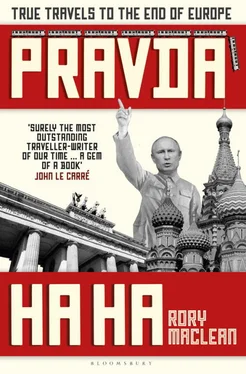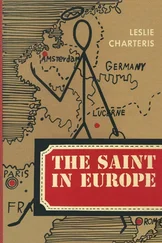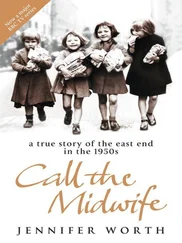Finally, special thanks to Ekaterina Petrovna for sharing the secret of pipiska putina . Some days I wake up with my brain still sizzling. Nu pravda ze?
Rory MacLean is one of Britain’s most expressive and adventurous travel writers. His books – which have been translated into a dozen languages – include UK top-ten bestsellers Stalin’s Nose and Under the Dragon as well as Berlin: Imagine a City , which was named a Book of the Year by the Washington Post .
Stalin’s Nose
The Oatmeal Ark
Under the Dragon
Next Exit Magic Kingdom
Falling for Icarus
Magic Bus
Missing Lives
Gift of Time
Back in the USSR
Berlin: Imagine a City
In North Korea
Wunderkind
Pictures of You
www.rorymaclean.com

BLOOMSBURY PUBLISHING
Bloomsbury Publishing Plc
50 Bedford Square, London, WC1B 3DP, UK
BLOOMSBURY, BLOOMSBURY PUBLISHING and the Diana logo are trademarks of Bloomsbury Publishing Plc
First published in Great Britain 2019
This electronic edition published 2019
Copyright © Rory MacLean, 2019
Map © ML Design, 2019
Czesław Miłosz’s A Book in the Ruins from New and Collected Poems 1931–2001 © Estate of Czesław Miłosz, 1941. Reprinted with permission of Penguin Books
Nineteen Eighty-Four by George Orwell © George Orwell, 1949. Reprinted by permission of Bill Hamilton as the Literary Executor of the Estate of the Late Sonia Brownell Orwell
Aleksandr Solzhenitsyn’s Nobel Prize Lecture reprinted with permission © The Nobel Foundation, 1970
Dmitry Glukhovsky quoted with permission from his 2016 I’m Dmitry Glukhovsky reddit.com/r/books posts
‘Kocham wolność’ © Estate of Bogdan Łyszkiewicz, 1990. Reprinted with permission of Anna Łyszkiewicz
Parts of the Transnistria chapters first appeared in The Times and Back in the USSR: Heroic Adventures in Transnistria by Rory MacLean
Rory MacLean has asserted his right under the Copyright, Designs and Patents Act, 1988, to be identified as Author of this work
For legal purposes the Acknowledgements constitute an extension of this copyright page
All rights reserved. No part of this publication may be reproduced or transmitted in any form or by any means, electronic or mechanical, including photocopying, recording, or any information storage or retrieval system, without prior permission in writing from the publishers
Bloomsbury Publishing Plc does not have any control over, or responsibility for, any third-party websites referred to in this book. All internet addresses given in this book were correct at the time of going to press. The author and publisher regret any inconvenience caused if addresses have changed or sites have ceased to exist, but can accept no responsibility for any such changes
A catalogue record for this book is available from the British Library
Library of Congress Cataloguing-in-Publication data has been applied for
ISBN: HB: 978-1-4088-9652-5; TPB: 978-1-4088-9653-2; EBOOK: 978-1-4088-9654-9
To find out more about our authors and books visit www.bloomsbury.comand sign up for our newsletters
Peskov, one of Vladimir Putin’s right-hand men, is alleged to have controlled the dossier of kompromat – compromising material – on Donald Trump and Hillary Clinton that was used to influence the 2016 US presidential election, according to former British intelligence officer Christopher Steele. In 2019 his daughter Elizaveta Peskova worked as an intern to Aymeric Chauprade, a French MEP who used to be a member of Marine Le Pen’s Front National.
In fact all the German vehicles at Patriot Park were replicas, newly made in Russian factories as there were no longer enough originals to go round. In 2018 the Kremlin had even repatriated from Laos thirty of its own vintage T-34s to star in military parades and film shoots.
Vneshtorgbank or VTB was no ordinary bank, according to the Guardian ’s Luke Harding. Two successive FSB/KGB spy chiefs sent their sons to work for it, and its deputy chief executive chaired the FSB’s public council. The bank also agreed to make many expedient loans, including for the proposed (and then aborted) Trump Tower Moscow, claimed Harding in his book Collusion.
In some quarters the victims of Stalin’s many purges are known as ‘Stalin’s chips’. Stalinskiye shepki . A 2019 opinion poll indicated around 25 per cent of Russians believe his campaign of political terror was ‘historically justified’. No mention of Stalinist terror is made in the official school curriculum.
No one knows the true extent of Putin’s wealth but it is rumoured to top that of Amazon’s Jeff Bezos and Microsoft founder Bill Gates. His huge fortune is said to be distributed across a secret web of company holdings and properties as well as in the names of friends and associates.
Russia did not act alone, of course. The West had – and has – its own virtual disrupters and digital kleptocracies, working solo or in concert, targeting and manipulating behaviour either to make a buck or to turn a country against itself.
For all its avowed realism, Seventeen Moments of Spring strayed well beyond the facts. In the last months of the war, a German general did meet the Americans in Switzerland to discuss the surrender of troops on the Italian front – but the Soviets were told about those meetings. No talks were ever held either on a complete German surrender or on a political settlement, as is claimed in the film.
According to the Guardian , the number of British citizens living in Russia fell from 180,000 to 30,000 between 2014 and 2016. Numbers fell further in the collapse in UK–Russia relations after the Salisbury nerve-agent attack. In 2019 the Telegraph estimated that there were 1,688 British expats in Russia. ‘Did an audit,’ one British former resident told the Guardian. ‘Everyone’s basically left.’
Parkhomenko was inspired by Stolperstein , the brass-capped ‘stumble stones’ that have been planted among the cobbles of 500 German towns and cities, engraved with the names of individuals murdered by the Nazis. But in contrast with the Germans, few Russians accept that past atrocities must be unearthed and confessed for the psychic health of a society. Hence, whereas 75,000 Stolpersteine have to date been laid across Western Europe, only 750 ‘Last Address’ plaques had been put up in Russia, by a few brave, individual volunteers like Alexa.
In the thirteenth century, crusaders had breached the fort’s ramparts, destroyed the statues of the hammer-wielding god Tharapita and subjected the pagan Saarlanders to a mass baptism. Legend has it that afterwards those independent souls had scurried away to the nearest river to wash off the foreigners’ Christianity.
Russia’s sense of messianic mission was magnified further by the 2018 split of the Ukrainian Orthodox Church from the Moscow Patriarchate. The schism was called the most significant rift in Eastern Christendom since 1054, when Eastern Orthodoxy separated itself from what is now the Roman Catholic Church. But the break had less to do with faith than with power, and Putin’s use of the Church to legitimise many of his actions.
Читать дальше


![Эдвард Докс - Pravda ['Self Help' in the UK]](/books/33503/edvard-doks-pravda-self-help-in-the-uk-thumb.webp)










